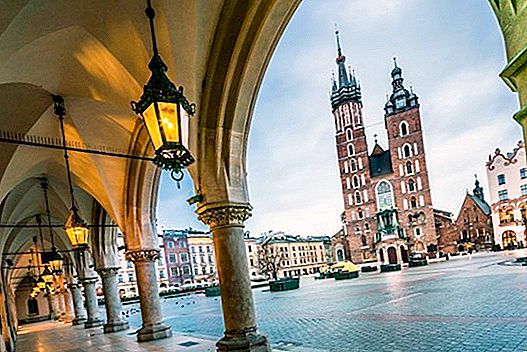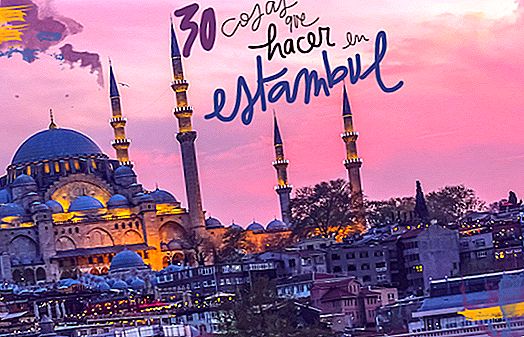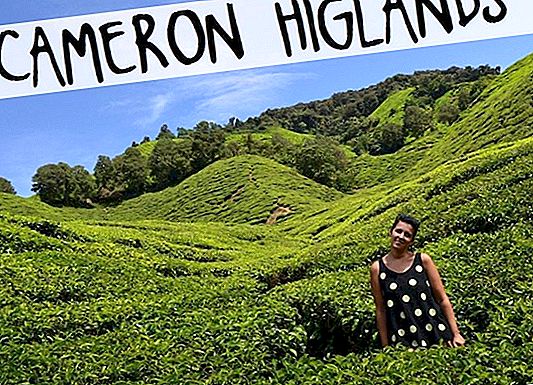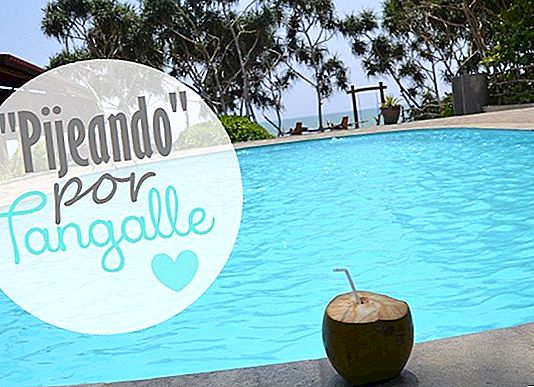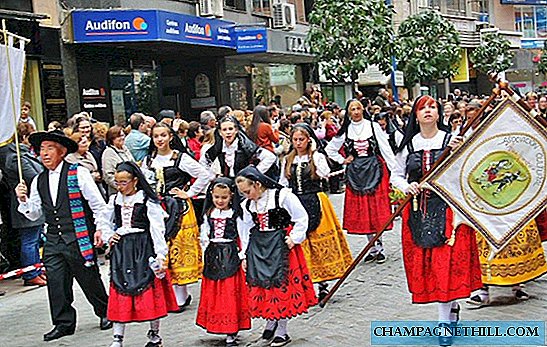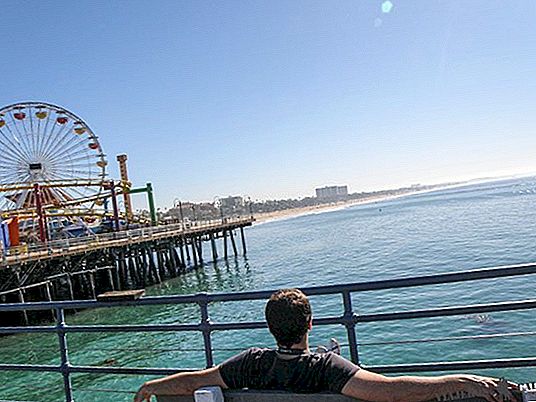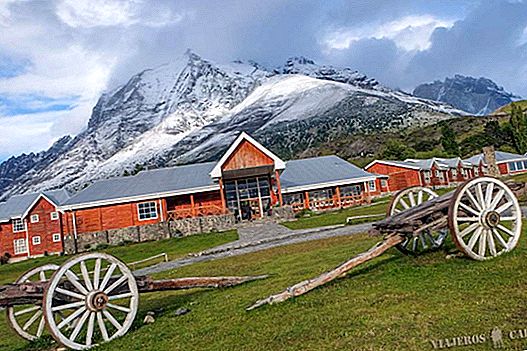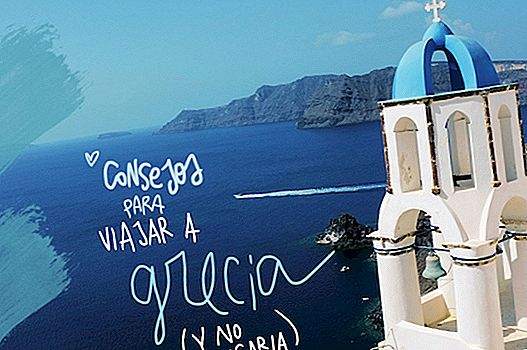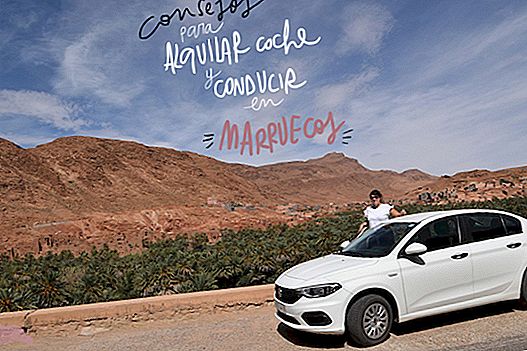
Although a priori it may seem crazy, rent a car and drive in Morocco It is one of the best experiences you can live in our neighboring country. It will allow you to reach lesser known places, stop on the route in small villages, drive through narrow trucks that cross incredible landscapes, and in general, have more freedom and independence to travel around Morocco.
Ok, but ... how is that driving in Morocco? How are your roads? Do I need a rally course taught by Nasser Al-Attiyah to survive? Simply put: driving in Morocco is not as risky as it may seem. But let's dig a little deeper and give you a few tips for driving in Morocco and for renting a car.
If your plans are to know several areas of Morocco, if you have enough time and do not mind driving in a foreign country, where you will find everything on the road, renting a car is the best option to travel around Morocco!
But what we advise against these three cases:
- You have Little time And you want to focus on getting to know a city and getting away during the day. Renting a car for a single day is not a good idea, it usually takes a long time to pick up, the first km are from trial (both with the road, with the GPS, etc.) and maybe it is worth paying a little more for some organized excursion
- Do not you feel comfortable driving in other countries, or You never did. In that case Morocco is not the ideal destination to start.
- You travel alone and you don't want them to shoot Expenses. Renting a car is an excellent option if you travel as a couple or in a group, so you can divide the transport costs, but being one, it will be more important to travel by train or bus.
Also, transportation in Morocco is not a wonder. The trains They are the best option, but the network is quite limited (basically the line that connects Marrakech with Casablanca, Rabat and Tanger, and an inner line between Meknes and Fez that continues eastward). Yes there are two big bus companies (CTM and Supratours) with different routes throughout the country (check out their websites / applications to see schedules, prices, etc.) and other smaller companies for shorter trips.
Once we have decided that we will rent a car in Morocco, ask yourself How to book and with what company? We always recommend using a car rental comparator like Auto Europe, it is the one we use and we never had problems. It basically compares between different car rental agencies for the selected dates and pick-up / delivery points, offering the best options.
Here we detail the rental process of the car in Morocco:
1. Collection and delivery data
First you will have to enter your website, put the city of collection and delivery and the dates. You have the possibility of setting up different offices for collection and delivery, as was our case: we started in Marrakech and finished in Fez, 12 days later. Although you can reduce the 10-day roadtrip, in what can be a good example to see prices and conditions… Read on!
* Be careful, if the delivery time is after the pick-up time, one more day of rent tends to be charged.
2. Comparison between agencies
Then you will see all the agency options rental, sorted by price and by type of car. Here you will have to do a little research and read comments about some of them, although honestly, we usually book the one with the best prices. As for the Car type, in this case we chose a mid-range car (a Fiat Tipo), but the smaller model can serve without problems.
It is important that you look at the “rate details”Of each of the options and check the amount of the franchise, which rates are included and which are not, basic coverage, etc.
*. One-way rate
In our case, when returning the car in a different office, a rate of one way, which will be added to the total rental price. However, this amount is not paid in the reservation, but must be paid directly at the rental office at the pick-up.
3. Hire insurance (or not)
The next step is to hire a extended insurance. The basic rate includes insurance with an amount of franchise, which will be the maximum money you will pay in case of accident or damage to the car. If you take out extended insurance, you can go quieter.
They usually offer you two additional insurance options: franchise reimbursement and Super Cover. Let's see what the differences are:
- Franchise Refund: in case of accident, theft or damage to the car, the full amount of the expenses is returned. But usually does not include damage to moons, ceilings, floors and wheels, so the price is cheaper.
- Super cover: return of the franchise, including damage to all elements of the car.
You have to know that these insurances are those offered by Auto Europe, so external to the agency itself of rent. How do they work? If you have had a mishap and they charge you with money, they have to give you a certificate of damages, which will be what you have to present to Auto Europe to get the amount paid back.
Obviously you also have the option of hiring a insurance directly with the rental agency itself. They will offer you (insistently) their own insurance options, which are usually much more expensive. With these insurances, in principle they should not block you any amount on the credit card, and in case of damage / accident they do not make you advance any payment.
IMPORTANT: in both cases the service of roadside assistance. In a service that is contracted separately in the rental agency itself and that is not included in any insurance.
It must be said that both extended insurance and roadside assistance they are optional. You are not obliged to hire anything, but it is true that it gives you some peace of mind when driving. We DO catch Super Cover insurance and DO NOT hire roadside assistance.
At this point of the reservation, the optional equipment, such as chairs for children, GPS, etc. All with an extra cost.
4. End of the process and payment
The last screen will be to enter personal information and make the payment. You will receive an e-mail with the reservation details, which will remain confirmed and paid.
Print the voucher and take it to the agency, along with your driving license and one credit card (not debit) to make theblocking of the amount of the franchise. By the waySpanish driving license It is valid for driving in Morocco.
At the pick up you will have to pay only the extra of the one-way rate (in case the delivery of the car is in an office other than the collection), to which the corresponding rates apply (we pay as € 80 or € 90).
Oh, and another important thing, this reservation is cancelable and modifiable Up to 48 hours before pickup.
IMPORTANT: when you pick up the car, check your outside, the sheet metal, the crystals, the wheels, the bottoms ... all at the end of your finger, and have them point out each of the little things you see on the contract sheet. make videos and photos of all parts of the car (especially the windows). When we delivered the car we wanted to nail a ralloncillo that was in the moon (which could be 0.5 cm and was not even broken) and we spent about 30 minutes saying that that is why no part should be done, until they agreed. But beware!
As we anticipate, driving on the roads of Morocco is not the odyssey we have in mind. It is true that it has little to do with what we are used to and that we will get a few surprises, but with a tad of attention there will be no major problem. And to help you keep it that way, let's give you a few tips for driving in Morocco:
Road condition
On the 2,000 km route we took from Marrakech to Fez through the interior of Morocco (here you can see it), national and regional single-lane roads are used in 99% of cases. Except at the entrance to the big cities, where they expand with some more lane. For the general are in acceptable condition, with a safe and well marked floor. But we find sections of many curves (usually when climbing mountain passes) and areas under construction, where the march slows down a lot. But in general, the state of the roads in Morocco is not something to worry about in excess.
In the last 10 years a extra effort to increase fast roads, improve the condition of secondary roads and increase road safety.
On this website you can see the state of the roads in real time (accidents, retentions, roads cut, etc): www.admtrafic.ma
One thing to keep in mind is that speed averages They will be reduced. On these national and regional roads they pass through many villages, where speed is reduced.
If your route is through the north or west coast, you will pass through toll roads, with better conditions (then we'll talk about them).
Tolls
On the route from Marrakech to Fes, we don't find any toll roads, except in the section between Meknes and Fez. Toll roads are concentrated in the west coast of Morocco, and the price is not excessive. You can calculate the routes and the price of tolls on the same website: www.admtrafic.ma.
Wikipedia.org
These are the toll prices from some sections important:
- Marrakech - Casablanca (250km): 82D (€ 7.5)
- Casablanca - Rabat (70km): 23D (€ 2)
- Rabat - Tangier (240km): 91D (€ 8.5)
- Fez - Meknes (50km): 13D (€ 1.2)
The way of paying It is like the one we know, either with an electronic reading system of the license plate, or picking up a card in the first booth at the entrance of the highway, which is subsequently delivered to the exit booth, where it is paid. By the way, the payment is only in cash (card payments are not accepted at the moment). There is also an auto toll system, but we don't think it's interesting for a tourist trip.
Traffic
On our route we don't notice it as crazy. At the entrance and inside the large towns, or on the main roads, perhaps it is considerable, but it was not a major problem. The highest concentration was in the mountain passes or slopes, where trucks they are stepping on eggs and it is difficult to overtake them by the amount of curves.
EYE: even if it is not road traffic, you have to keep in mind that on secondary roads it is very easy to meet donkeys, cars, dogs, flocks of sheep, children who go to school ... Caution!
Another thing is in Marrakech or Fes (and we assume that the rest of big capitals), where if you have to go with a lot of concentration and patience to get out. There are lots of cars screaming and trying to enter the roundabouts at once ... Pay attention to both sides, and be determined.
Maximum speed and radars
In the freeways toll, the maximum speed is 120 km / h. In the back roads it is between 80 and 100 km / h. When you are going through a village, It is reduced to 50 or 40 km / h. It is important that you are attentive to the changes of the limits and stick to them, because in Morocco it is very typical that you are fined for speeding.
They get with mobile radars hidden in the same direction of your march, and once you fall (usually in areas with low speed limits, in towns, etc.), they wait for you where they fine you, usually with 400 dirhams in metalic. In that case, maybe you can “negotiate” the amount and reach an agreement…
Entry and exit in the villages
Every time you enter or leave a town, you will see a police control with a sign where you can be told either to stop, or to slow down (in Arabic and French). In case the stop is requested, keep an eye on the officer who will give you a gesture that you can continue.
Police checks
We were with the fly behind the ear thinking that they would stop us continuously to get us some money, but it was NOT like that. The controls they make in the villages are usually more destined for Moroccans themselves than for tourists or this is what we saw. Come on always they let us through without problems.
Yes, they stopped us on one occasion, and that is that we passed a tractor with a continuous line and apparently they saw it in a fixed chamber that they had right there. They stopped us a few meters later and asked us for the papers. They told us that they had caught us but they didn't even fine us ...
It was our experience, we don't know if in other places in Morocco the police are more corrupt and ask for bites. What is certain is that on Instagram Stories several travelers told us that the experience they had was different: several were fined (apparently unfairly) and others were beaten for nonsense, in order to "fix" the matter with a few tickets: - /
Eye to the roundabouts
We find two types of roundabouts: the classics to which we are accustomed, where the one inside the roundabout has the preference of passage, which used to be the most common and large. And others where the preference was for the cars that were incorporated, so you have to let them through even if you are already inside the roundabout. The latter were the least common, but you know they exist. In order to differentiate there are signs that indicate a few meters before reaching them (as a step gives way).
Parking in Morocco
In most villages where we spent the night or the places we visited, there were free parking areas without problems. But friend, in the big cities It is another story. In that case, it is best to ask your accommodation about the nearest PAYMENT car park one day in advance. We always prefer to leave it in this type of parkings (guarded), before we play it and park in some street. The price is usually around 20 or 30 dirhams per day.
4 × 4 or conventional car?
We do not believe that spending more to rent a 4 × 4 is interesting. If you are going to make a more or less tourist route and in your plans it does not go off the road, with a normal car it is more than enough.
Gasoline price
Gasoline in Morocco is cheaper than in Spain. Calculate approximately € 1 - € 1.10 / liter. You can see the current price here. On the other hand, there are quite a lot of gas stations, but our rule (after almost being thrown a few times on other trips) is to fill it when the deposit goes in half.
We hope all these tips for driving in Morocco They can help you to have a wonderful trip in this amazing country. You know, take away your fears and rent a car in Morocco, is the best way to explore it thoroughly!

Save on your trip
Flights Cheap to Morocco: bit.ly/2lLTv8O
accommodation Cheap in Morocco: bit.ly/2p2aoNc
Stay withAirbnb and get€ 25 discount: here
Activities in Spanish in Morocco: bit.ly/2l71f53
Rent a car with the best discounts: bit.ly/2xGxOrc
Compare prices in the van rental: bit.ly/2IFbMeB
Travel insurance IATI with a5% discount: bit.ly/29OSvKt
Books and travel guides: amzn.to/2lIrtLx
All our articles about Morocco

